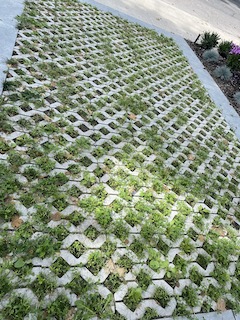
We planted what we thought would be nice, colourful, low-growing wildflowers in our permeable pavers. Instead, the pavers are filled with weeds that spread to our beds. They are not low growing so we have to mow it every week, which was not what was intended. (The permeable pavers are in our front yard and very occasionally we park on them.) Our neighbour said it looks like we’re growing artisanal salad!
We’re hoping to start over with something more appropriate. Creeping thyme has been recommended, for example. How do we start over? Do we have to dig out the wild flowers/weeds by hand (which will be laborious as there are about 300 little holes in our permeable pavers)? Is there anything else we can do to get rid of them? Is creeping thyme a good option?
Thank you.
Thank you for contacting Toronto Master Gardeners.
For best success, you will need to remove the weeds before you plant the new plants.
If the area is sunny, you could try solarisation, a low labour, non-chemical technique to eradicate the weeds. According to the University of California Integrated Pest Management:
“The method involves heating the soil by covering it with clear plastic for four to six weeks during a hot period of the year and when the soil will receive the most direct sunlight. Plastic tarps allow the sun’s radiant energy to be trapped in soil, heating the top 12 to 18 inches to temperatures lethal to a wide range of soilborne pests; including weeds, plant pathogens, nematodes, and insects. When properly done, the top layers of soil will heat up to as high as 140°F, depending on the geographic location. Soil moisture is important in this process, as wet soil conducts heat better than dry soil. Moisture also makes soil pests, weakened by the heat, more vulnerable to attack by beneficial soil microorganisms during and after treatment.”
In addition, solarization stimulates the release of nutrients from organic matter present in the soil. It is especially effective for treating garden soils, where the intent is to plant vegetables, herbs, and flowers.
Another lower effort weed removal option which may work better in shadier areas is covering the ground with thick black plastic. At first the weeds will grow rapidly due to the heat under the black plastic. However, over time they will die from lack of food since they cannot produce food through photosynthesis. This method takes time and will only work as long as no light reaches the plant.
The best choice of ground cover depends on the amount of sun and soil moisture that the pavers receive and the type of soil.
Creeping thyme would be a good choice for a sunny, well-drained area with low fertility soil. It can withstand moderate foot traffic. Vehicle traffic would impede its creeping behaviour, but it should grow in the area inside the pavers.
For shady areas, consider a low, creeping variety of Sedum.
For damp areas with some shade, you might consider Irish Moss and Scotch Moss
(Sagina subulata and S. subulata ‘Aurea’)
This link to a City of Guelph information page Groundcovers and lawn alternatives, details some ground covers that may suit your application.
Good luck with your replanting project.
September 18, 2021

